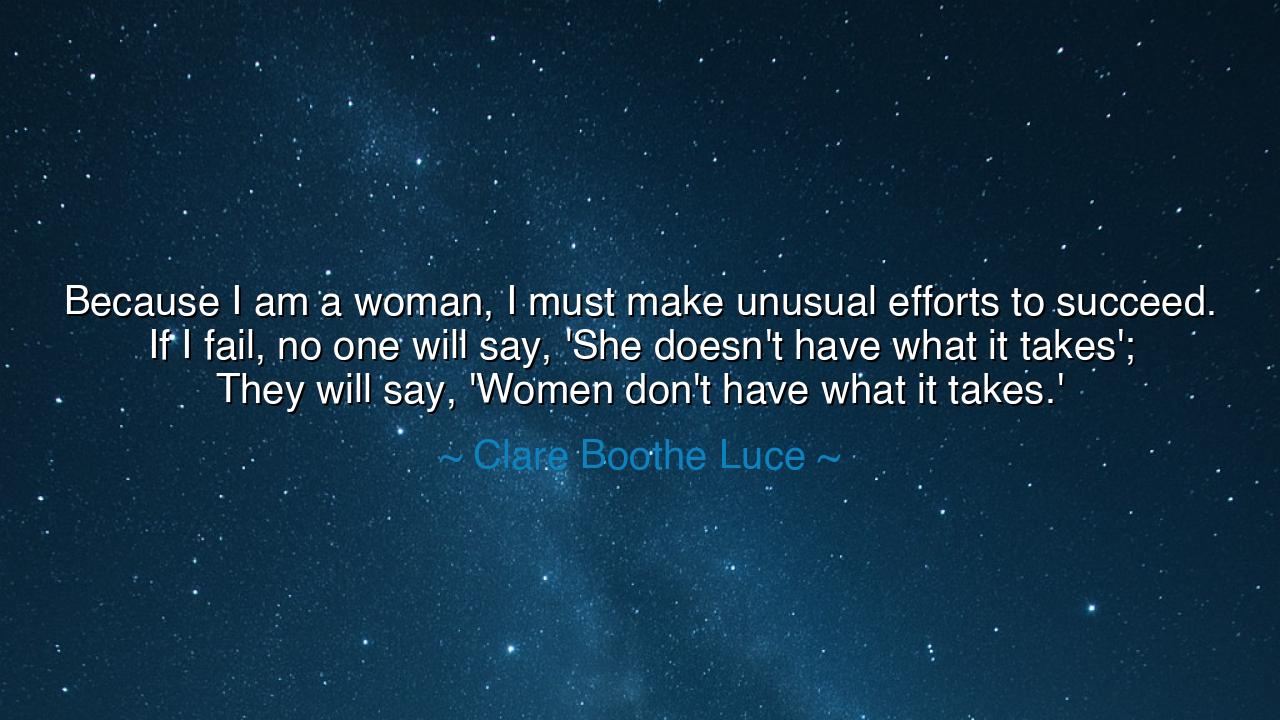
Because I am a woman, I must make unusual efforts to succeed. If
Because I am a woman, I must make unusual efforts to succeed. If I fail, no one will say, 'She doesn't have what it takes'; They will say, 'Women don't have what it takes.'






The words of Clare Boothe Luce, playwright, ambassador, and fearless woman of her age, strike with the weight of injustice: “Because I am a woman, I must make unusual efforts to succeed. If I fail, no one will say, ‘She doesn’t have what it takes’; They will say, ‘Women don’t have what it takes.’” In this saying she unveils the burden placed upon women, a burden heavier than that carried by men: for her struggle is never only her own, but judged as the trial of her sex entire.
The ancients, too, knew this cruel measure. When Hypatia of Alexandria, the philosopher, dared to teach in the public square, her brilliance was not taken as proof of women’s potential, but her tragic death was used by enemies to silence the very thought of women in power. Individual failure in men is seen as weakness of one man, but in women it becomes the condemnation of all. Luce, with fire in her voice, calls this injustice by its name.
Her own life bears witness to the truth. Rising as a journalist, playwright, and later a congresswoman and ambassador, she faced the gaze of those who doubted. Her victories were not hers alone; they lifted the standing of women everywhere. But had she stumbled, her enemies would not have said, “Luce was weak,” but rather, “women cannot govern, cannot lead.” Thus her every act demanded “unusual efforts,” a labor not only to achieve but to defend the honor of her sex.
Consider also the story of Amelia Earhart, who soared into the skies. When she succeeded, the world marveled at women’s courage; but had she failed, it would have been used as proof that women could not fly. In her, as in Luce’s words, we see the weight of representation: the woman is never allowed to be simply herself, but becomes a vessel of judgment for all women. This burden is both unjust and heroic, for it demands extraordinary strength.
Let the generations remember: the measure of women has too often been written not by their achievements, but by the failures imposed upon them by a world of men. Clare Boothe Luce speaks across the ages, reminding us that every woman who strives does so carrying more than her own destiny—she carries the hope of others, and the suspicion of the world. Her words are both lament and summons: that society must learn to judge with fairness, and until it does, women will rise with unusual effort, proving again and again that they indeed “have what it takes.”






PTPham Tam
Clare Boothe Luce’s quote captures the unfair burden that women carry, especially in terms of societal expectations. It’s discouraging to think that women’s individual achievements or failures are often seen as representative of an entire gender. What can we do to change the narrative, where women are allowed to succeed or fail based on their individual merits without the weight of being a ‘representative’ for all women?
NTMinh Hang Nham thi
Luce’s words resonate with the challenges women have faced—and continue to face—when trying to succeed in male-dominated fields. It’s frustrating that women’s failures are so often generalized. But does this quote imply that women should work harder to prove themselves, or does it highlight the injustice of having to do so in the first place? How can we create a world where women are evaluated on their abilities, not their gender?
TKDang cong tuan kiet
This quote really emphasizes the double standard women face when it comes to success and failure. I can’t help but wonder: why does society still hold this view that one woman’s failure reflects on the abilities of all women? If a man fails, he’s just seen as an individual, but women carry the weight of their gender on their shoulders. How can we break down this unfair judgment and allow women to fail without it being a reflection of their gender?
BTTo Bao Tram
Clare Boothe Luce’s quote highlights the heavy expectations placed on women to prove themselves in a world that often holds them to a higher standard. It’s disheartening that women’s personal failures are often generalized to reflect an entire gender. This kind of pressure is something that men generally don’t face. How much longer will society continue to hold women responsible for representing all women in every role they take on?